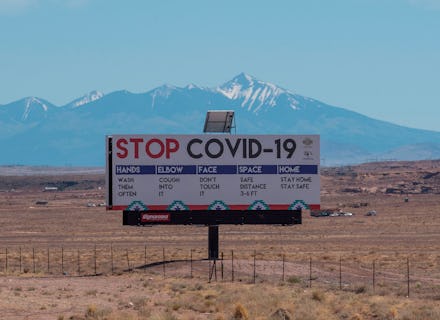A judge told the Trump administration to give Native tribes the coronavirus money they're owed

Nearly two months after an initial federal deadline to distribute hundreds of millions of dollars in coronavirus relief to a number of Native tribes, a judge this week ruled that Treasury Secretary Steve Mnuchin has no legal basis for withholding the funds and ordered the government to release the money.
In his ruling, U.S. District Judge for the District of Columbia Amit Mehta wrote that "public health concerns are at their zenith. As the court previously observed, 'the COVID-19 pandemic presents a national health emergency that is without precedent in modern times.'" He continued, stating that "continued delay in the face of an exceptional public health crisis is no longer acceptable."
Citing the "irreparable harm" that could be done to the tribal plaintiffs if the funds remain withheld, Mehta gave the Treasury Department until Wednesday to release some $679 million of the $8 billion earmarked for native communities in March's CARES Act, the pandemic relief bill.
In part, the issue stems from the methodology used by the Treasury Department to determine how much money would be distributed to nearly 600 federally recognized tribes, and how. As the Associated Press notes, an initial batch of funds was dispensed based on federal tribal population data, while a second batch used tribal employment and expenditure figures. Several lawsuits have been filed by multiple tribes regarding the way funds were allocated, which, the Treasury Department argued, justified the delays in payments, while the cases were being adjudicated in court.
Mehta, however, disagreed. Per his ruling:
[T]he secretary’s withholding of $679 million “to resolve any potentially adverse decision in litigation” [...] simply cannot be justified. For one, it is not clear what authority under the CARES Act the secretary possesses to make such a withholding. The CARES Act directs the secretary to determine amounts to be paid to tribal governments “in such manner as the secretary determines appropriate to ensure that all amounts available under subsection (a)(2)(B) for fiscal year 2020 are distributed to tribal governments.” 42 U.S.C. § 801(c)(7). The secretary already has “determined” the amounts that should be paid to each tribal government [...] His obligation now is to distribute those funds.
Put another way: Mnuchin has fulfilled his obligation to allocate the tribal money set aside in the CARES Act, and has no legal basis to prevent that money from actually being delivered to its intended recipients.
Mehta's ruling comes as tribal nations have struggled during the coronavirus pandemic, where factors such as underfunded medical resources, a prevalence of pre-existing medical conditions, and poverty have combined to ensure that the Native population has been among the hardest hit by COVID-19.
"For Indian Country, the struggle is to get their fair share of federal resources, and this is not a new problem,” New Mexico Sen. Tom Udall (D), the vice chair of the Senate Indian Affairs Committee, explained. “That’s part of the reason why this is such a dangerous time for Native communities: They’ve been left behind by the federal government."